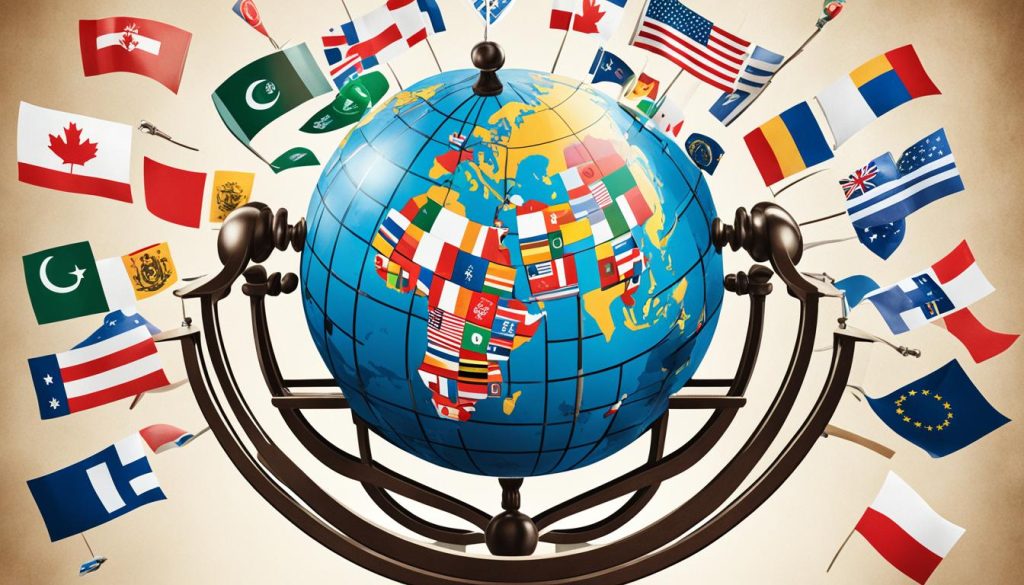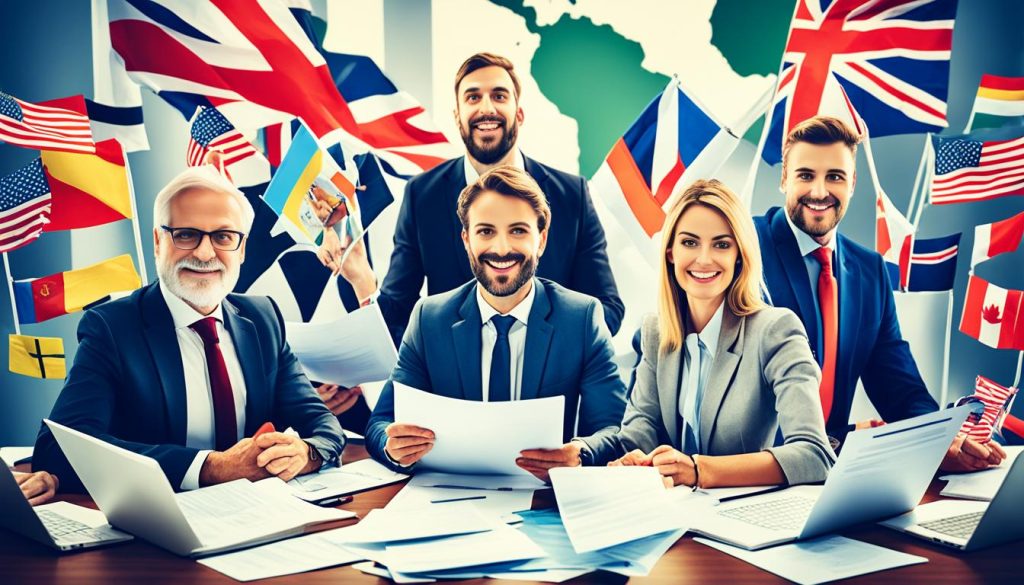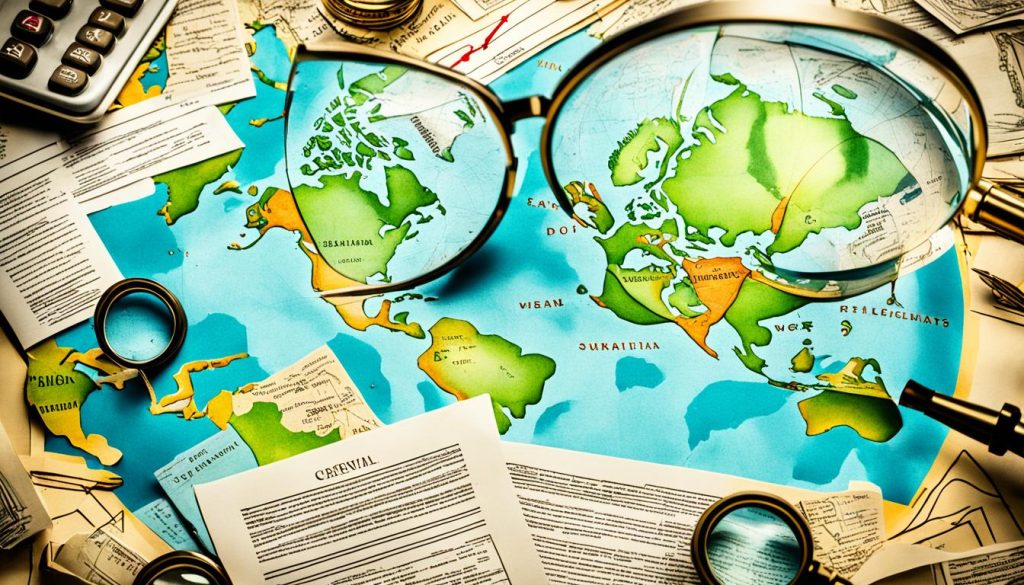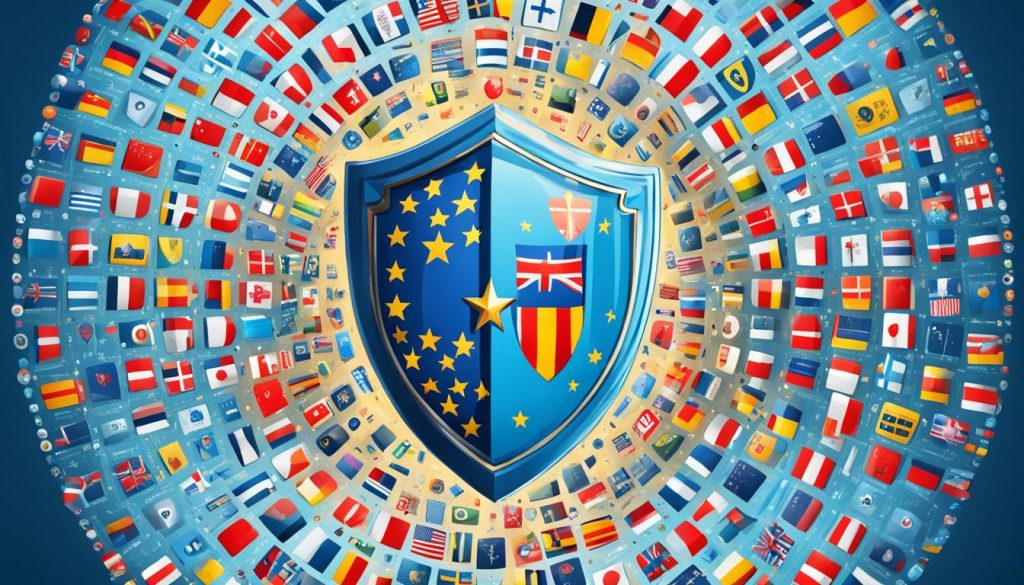As I sit at my desk, thinking about the vast world of trade, Sir Richard Branson’s words echo: “Screw it, let’s do it.” He encourages us to explore beyond our local markets. The excitement of going global is clear, but so are the challenges.
To succeed, we must understand the complex world of international business. This includes global commerce and the laws that shape it. Such an exploration demands courage, smart planning, and a profound legal insight.
Let’s start our exploration into the challenges global leaders face. Every choice they make can change international laws and their business’s future. They strive to follow varied laws while protecting their ideas worldwide.
Companies look to both seize opportunities and stay within the law. They deal with trade policies like free trade agreements and comply with EU rules. Expanding businesses face challenges like different tax laws, employment rules, and resolving disputes smartly.
Navigating the Complex Maze of International Legal Frameworks
Success in global business depends on knowing and following many different laws. Companies need to work with legal experts and groups. This helps deal with export rules, customs, and keeping their ideas safe in other countries. It also makes it easier to talk about trade deals.
Ensuring Compliance with Diverse Governmental Regulations
Understanding all the international laws is key to doing well around the world. Businesses have to watch many rules, from what you can take across border to how to treat staff right. Working with legal experts and global groups is crucial to doing everything right. This helps avoid the big problems of breaking the rules.
Safeguarding Intellectual Property Across Borders
When companies start selling in other countries, they must protect their ideas even more. This means getting patents, trademarks, and copyrights in many places. It stops others from copying their work. Using global rules and legal advice can make their plan to keep ideas safe a lot stronger. This is needed because every country has its own laws.
Negotiating Trade Policy Agreements and Abiding by Regulations
Understanding trade deals and following the rules from places like the European Union is a must for global success. Companies need to know the laws well to make good trade agreements. They also have to make sure they’re following every rule. This keeps their business running smoothly everywhere.
Understanding and Complying with Diverse International Laws and Regulations
In the world of global trade, understanding various legal systems is key. Companies aiming to go international face many laws. These include trade regulations, data protection laws, and rules against corruption and bribery. It is wise for such companies to work closely with a knowledgeable international law expert. This helps them avoid legal traps.
Knowing and following international laws and regulations is crucial for worldwide success. Breaking these laws can lead to big fines and harm a company’s name. So, firms must stay up to date with the laws where they do business. They should also keep their rules in line with any changes made.
Working with lawyers who are experts in compliance and international law is very helpful. They offer advice on many legal aspects, from trade deals to protecting data. With their help, companies can grow globally while playing by the rules.
For global operations, being on top of international laws and regulations is a must. Companies should team up with legal professionals. This ensures they are ready to deal with any legal challenges. It also helps them move forward with their international plans, knowing they are compliant.
Engaging Legal Experts and Institutions to Navigate Challenges
In international business, understanding legal rules is very important. This is especially true when companies want to grow overseas. Legal experts and international organisations help a lot. They ensure companies follow the rules correctly. This is not only about keeping promises to clients but also about being ethical.
Customs and Export Controls
Partners in trade are key in understanding international laws. They help with free trade agreements and rules from the World Trade Organization. To use these laws well, companies must know the ins and outs of them. This knowledge is vital for smooth business, ensuring products move between countries easily.
Intellectual Property Challenges
For companies to succeed globally, they need to protect their ideas in different countries. They must also know each place’s laws for their overseas staff. Working with international lawyers or having a global legal expert on board is critical. It helps deal with legal risks well and keeps operations running smoothly.
Efficient Dispute Resolution Through Arbitration and Mediation
In global trade, coping with various laws and rules can be hard. This can lead to arguments that risk business connections worldwide. Yet, ways like arbitration and mediation bring hope, acting as strong supports in the global marketplace.
Maintaining Stability and Minimizing Conflict
Arguments in international commerce come from many areas. They range from enforcing trade deals to aligning product standards. Using arbitration and mediation can keep companies safe and protect their global operations. These methods help find friendly outcomes and keep business partnerships strong.
Skilled legal and trade advisors are key in solving issues. By working with groups like the International Trade Administration, they make sure companies follow contracts and customs laws. This helps make the international commerce scene more steady and successful.
Managing Complex Taxation Issues for Financial Health
The world of business is always changing. Companies must carefully deal with many tax issues to stay financially strong. This includes understanding how to price things properly and using tax treaties wisely. This way, businesses can follow the rules, save money, and stay ahead financially.
Transfer Pricing and Tax Treaty Navigation
When companies trade goods and services between their own parts, this is transfer pricing. It needs to be done following specific rules from groups like the OECD. Doing it right helps avoid fights with the tax office and keeps money safe.
Using tax treaties well is also vital. These treaties help lessen taxes on international business and make investing across borders easier. Companies should always be sharp about knowing the details of these treaties. This helps them pay less in taxes and make the most of good business chances.
Getting good at handling tax stuff helps companies do better in the market. By focusing on the right transfer pricing and tax treaties, businesses can plan their taxes better. This means more profit and a stronger financial position even with changing rules.
Crafting Compliant International Workforce Strategies
Companies face complex challenges in international markets, balancing diverse laws and cultural needs. Meeting these demands is crucial for success worldwide, not just a legal requirement.
Aligning with Varying Employment Laws
When companies go global, they must match their HR strategies with local laws. This means understanding how to hire, fire, and take care of employees. Working closely with experts in each region is key to getting it right.
Considering Cultural Considerations
International teams need more than just legal smarts. They have to understand and respect different cultures. This involves breaking language barriers, tuning up how we talk, and learning customs. Creating a rich and respectful work setting is crucial for team success.
Identifying Key Legal Frameworks Across Jurisdictions
Companies dealing across borders face different business laws in each country. They must understand these legal variations well. Businesses often work with local legal experts to make their international deals strong.
Understanding Employment Law for Overseas Employees
An organisation going global needs to know the law in different places. This includes rules on employing people overseas and following global trade laws. Getting help from worldwide law firms or hiring a legal expert who knows the world well is crucial. It helps a company avoid legal problems and keep its work running smoothly.
Adhering to International Trade Regulations
Getting to grips with world trade rules is key for smooth product movement. Firms selling abroad can find it tough due to many international laws and rules. These rules aim to make global trade fair and efficient.
Engaging with International Law Firms and Appointing General Counsel
Staying alert and working closely with legal and trade advice helps a company a lot. It makes sure a company follows the right rules and meets legal needs smoothly. Working with law experts from around the globe or having your worldwide law expert is a smart move.
Navigating Through International Trade Laws and Regulations
Bringing international trade laws and regulations into a business plan can be tough. There are many hurdles, from customs to applying international deals. To do this well, you must understand the rules that govern trade, like free trade agreements.
Export Controls and Regulations
It’s key to know these areas well to avoid legal issues when sending goods abroad. Companies that ship goods face challenges because countries have different rules. Being alert and talking with legal experts helps manage these problems.
Customs Procedures and Formalities
Be watchful and work closely with legal and trade advisors. This approach, with organisations like the International Trade Administration, helps companies follow the law and customs rules.
Trade Agreements and Free Trade Areas
Understanding trade pacts like free trade deals is essential for smooth trading. It keeps your goods moving without legal snags.
International Product Standards
Sometimes, selling abroad means dealing with various product quality rules. Staying alert and working with the right people, like the International Trade Administration, is vital. It helps handle problems and stick to trade and customs laws.
International markets often have different legal and regulatory requirements
Doing business in international markets is complex due to various legal and regulatory barriers. Global leaders need to be careful. They consider how each choice influences the worldwide legal system and their business.
Companies work hard to stick to different country’s laws and protect their ideas worldwide. They aim to do business legally while taking full advantage of opportunities.
Keeping things fair and legal might mean working on trade deals like free trade agreements. It might also mean following rules the European Union puts out. As companies grow worldwide, they face new worker rights, tax laws, and legal issues. They must handle these wisely to run their businesses right.
Businesses must be sharp to handle the complex web of international markets, legal requirements, and regulatory requirements. This way, they can find chances and stay within the law.
Staying Updated with Global Data Protection and Privacy Laws
Our world is becoming more digital each day. Global data protection laws matter a lot, especially for businesses that work across countries. It’s important to know the rules like the General Data Protection Regulation (GDPR) in the European Union. These laws influence how companies handle people’s personal information.
With laws always changing, keeping up is key. This helps businesses avoid legal issues and build trust with their customers. A legal team or a data protection officer can help. They make sure a company’s privacy rules meet the latest international standards.
Aligning with Regulations like GDPR
The GDPR in the European Union sets tough rules on handling personal data. Companies within the EU or dealing with EU citizens’ data must follow these rules. It’s about getting clear permission, respecting people’s data rights, and telling them if there’s a data breach. Doing this right helps businesses stay clear of fines and keep their customers’ trust.
Continuously Reviewing and Updating Privacy Frameworks
Data protection laws keep changing. So, it’s vital for companies to always check and improve their privacy rules. This means making sure the way they work fits with new laws, being more secure with data, and talking openly with people about their data. By keeping an eye on and improving their privacy actions, companies show they value protecting people’s digital rights and privacy.
Complying with Anti-Bribery and Corruption Laws Abroad
When doing business internationally, it’s key to follow strict anti-bribery and anti-corruption rules. This isn’t just good ethics; it’s vital for staying out of legal trouble and keeping a good reputation. Businesses must follow rules like the U.S. Foreign Corrupt Practices Act (FCPA) and the U.K. Bribery Act. This helps avoid penalties and stay reputable in global markets.
Implementing Stringent Anti-Corruption Policies
Putting in place strong anti-corruption policies shows a company is dedicated to legal and ethical business practices. It helps keep the company’s name clean in different legal systems. This way, all international business agreements are done honestly.
Conducting Transparent International Business Agreements
Being open in international business agreements stops problems from corruption allegations. Companies need to have strict rules and training to fight against corruption.
Avoiding Severe Repercussions Associated with Corruption Allegations
Sticking to the strictest anti-bribery laws and anti-corruption laws keeps a company’s reputation solid. Actively putting anti-corruption policies into action shows a company stands for ethical values. This defends its reputation and helps it succeed over time.
Safeguarding Intellectual Property in the Global Marketplace
In today’s world, businesses operate worldwide. Protecting their ideas and creations is vital. As they expand into new markets, these businesses face harder challenges in safeguarding their intellectual property. It’s crucial to have a strong strategy for protecting their patents and trademarks globally.
Securing Patents and Trademarks Internationally
Keeping their patents and trademarks safe helps companies fight against fake products and illegal copying. It also helps them stay ahead in the world market. Protecting their intellectual property worldwide keeps their innovations’ value high. This stops others from stealing or copying their ideas.
Enforcing IP Rights Across Different Countries
One big challenge for global companies is enforcing their intellectual property rights in many legal systems. Every country has its own IP laws. This means companies have to know and follow these laws to protect their intellectual property rights. They may need to register their IP in different countries and, if needed, go to court.
Leveraging International Agreements for IP Protection
In the fast-changing worldwide market, protecting intellectual property (IP) is key for companies looking to stay ahead. Using international pacts helps shield the products of creativity. These pacts are crucial for enforcing IP rights around the world, covering patents, trademarks, and other IP forms.
The main issue for global firms is applying their IP rights in various legal systems. Different countries have different IP laws, making it pivotal for companies to adapt. They must protect their IP by following local laws and securing patents or trademarks. By working with global IP treaties and trade deals, companies can tackle these challenges. This ensures their unique ideas and brands are safe abroad.
International agreements, from bodies like the World Intellectual Property Organisation (WIPO) to deals like those within the European Union, offer strong protection. They help companies increase their global protection against piracy and counterfeit products. This strengthens their standing in the intense global market.















